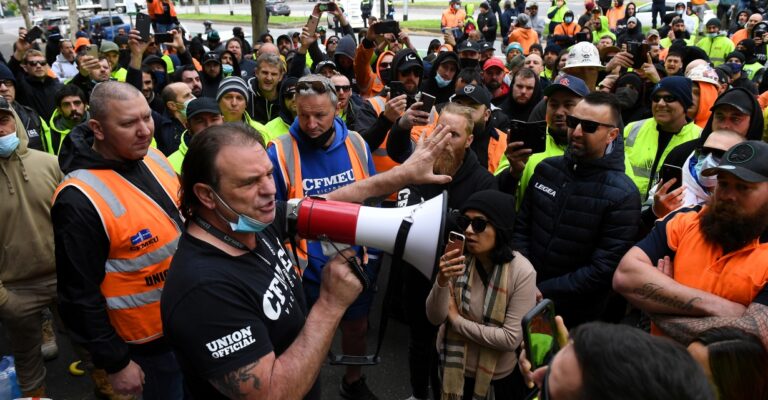
SYDNEY, (Reuters) – Australian authorities shut down construction sites in Melbourne for two weeks from Tuesday after an anti-vaccine mandate protest in the city turned violent and COVID-19 infections in the state of Victoria surged.
Hundreds of people clashed with union officials with bottles and a crate thrown at them, footage on social media showed, after the Victorian government required all construction workers to have at least one vaccine dose by Friday.
“We put the industry on notice just a week ago, we have seen appalling behaviour on site and on our streets, and now we’re acting decisively and without hesitation,” state Industrial Relations Minister Tim Pallas said in a statement Monday night.
Victoria police said “several people” have been arrested after specialist units and crowd control equipment were deployed.
The forced closures of construction sites will worsen the country’s economic activity with some economists predicting the extended lockdowns may push Australia’s A$2 trillion ($1.45 trillion) economy into a second recession in as many years.
Australia has locked down Sydney and Melbourne, its largest cities, and the capital Canberra to quell an outbreak of the highly infectious Delta variant. But these tough restrictions have triggered anti-lockdown rallies with police arresting hundreds in both cities over the weekend.
Authorities, meanwhile, have begun to ease some tough restrictions on outdoor gatherings and exercise in Sydney and Melbourne as vaccination rates surge, with more freedom promised once dual-dose levels in the adult population reach 70%-80%.
So far, 53% in New South Wales, home to Sydney, have been fully vaccinated while the coverage is 44% in Victoria.
A total of 603 new cases were detected in Victoria on Tuesday, the year’s biggest daily rise, eclipsing the previous high of 567 a day earlier, and one new death was recorded.
Even with the Delta outbreaks, Australia has kept its COVID-19 numbers lower than many comparable countries, with 87,700 cases and 1,168 deaths.






